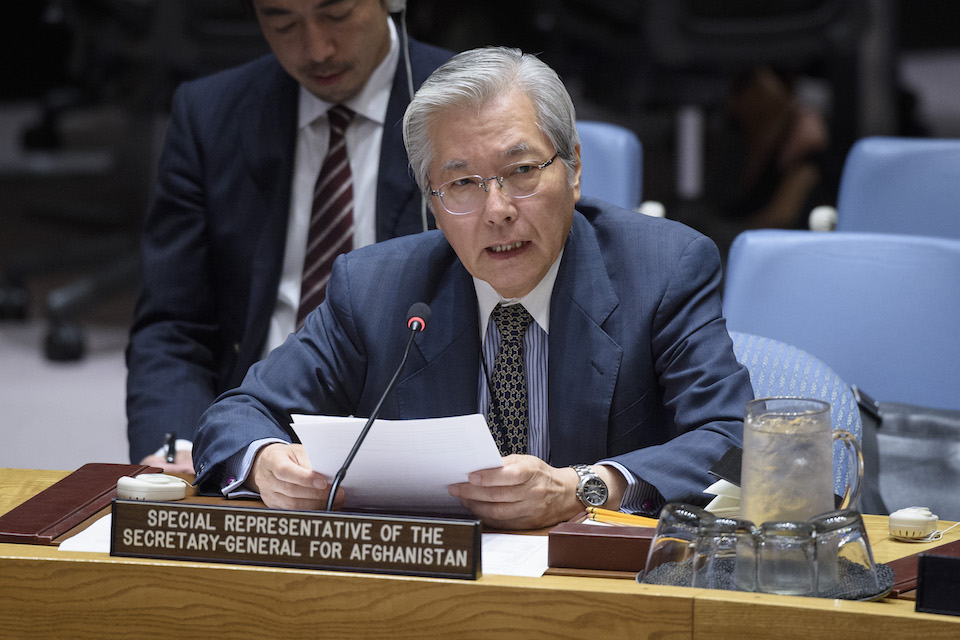Peace, fair elections and equal representation in Afghanistan
Statement by Ambassador Karen Pierce, UK Permanent Representative to the UN, at the Security Council briefing on Afghanistan.

Thank you very much, Mr President. And as it’s the first time I’m taking the floor in the Russians’ presidency, let me congratulate you. You have our full support. And also thank our Polish colleagues for their stewardship of the month of August. And I’d like to thank our briefers, the SRSG and Mr Fedotov and also our colleague from Afghanistan.
Like other speakers, Mr President, I’d like to particularly highlight four issues: peace, the presidential elections, UNAMA itself and the issue of women, peace and security. And along with other speakers this morning, I want to set out the United Kingdom’s strong condemnation of the Taliban for the recent attacks. Taliban representatives at the intra-Afghan peace conference in Doha in July this year committed to reducing civilian casualties to zero. But the Taliban’s actions are not matching their words. And indeed, on the eve of a historic meeting with United States representatives, the Taliban chose to carry out yet more attacks in Kabul. And the Afghan ambassador set these out. But the list I have before me, Mr President, lists at least five attacks since the month of August. These are not the actions of a group that is searching for peace. At a minimum, the leaders of the Taliban need to condemn violence when it occurs and undertake to do everything in their power to stop the rest of their groups from carrying out violence.
But they also need, Mr President, to get a united view that peace is in their interests as much as it is in the interests of the people of Afghanistan. And as I’m talking about the Taliban, I’ll take the opportunity now to reiterate what the SRSG said about him fighting them to retract the threats against the election.
President Ghani, we note, remains committed to direct peace talks and we share the speaker’s wish that the intra-Afghan negotiations can proceed apace. President Ghani has appointed a 15 strong negotiating team and he said only this Monday: “We are ready for peace talks. But if the Taliban think they can scare us, look at these warriors. But peace without a ceasefire is impossible.” And if there is to be lasting peace in Afghanistan, Mr President, the Taliban must enter into meaningful negotiations with an inclusive and representative Afghan negotiating team.
My second point concerns the elections. We are encouraged by what the special representative said about the elections remaining scheduled for 28 September. I know from experience in Kabul there are often many stories around the elections and many fears that they will be cancelled. So what I saw SRSG Yamamoto was able to say about these elections and the arrangements for them has been very important. They represent an important opportunity for the Afghan people to make decisions about their future at a critical time. And our ambassador in Kabul has in recent weeks met with Hawa Nuristani, the chair of the Afghanistan Independent Election Commission, and with Zohra Shinwari, the chair of the Electoral Complaints Commission. I think it’s important, Mr President, that the Council offer its full support to the Afghan authorities to help ensure the elections are credible, transparent, participatory and free as possible from violence, and that we encourage all the leaders to engage faithfully in the democratic process and to take a stand against electoral fraud.
Turning to my third point, Mr President, about UNAMA, we very much welcome the work UNAMA has done, especially in coordinating international support for the elections. And we hope that UNAMA will be able to continue this work at the same pace up to Election Day and beyond. Other speakers have referred to the UNAMA mandate that is due for renewal by 17 September. We hope all Security Council members will be able to support a text that gives UNAMA the clear and strong mandate it needs to support Afghanistan at this critical time.
And then turning to the issue of women, which the Afghan ambassador set out so eloquently. In all cases, the United Kingdom remains committed to a peaceful and democratic future for Afghanistan. And we will continue to work with partners and the Afghan authorities to ensure Afghanistan has the support it needs. And it is particularly important that she maintains the gains she’s made on human rights over recent years. Women play an essential role in Afghan society. This was underscored by the Deputy Secretary-General’s visit in July. And for the United Kingdom, we will continue to support the full implementation of Afghanistan’s National Action Plan on women, peace and security.
And I want to end, Mr President, by stressing the vital importance of women’s participation in the elections, but also in an inclusive peace process.
Thank you.